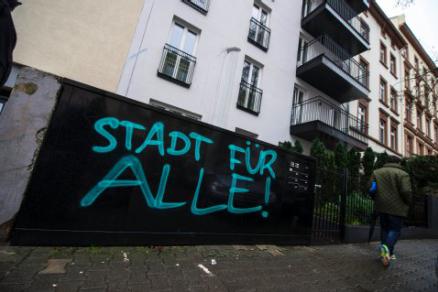
Imagine you would live in a city where all people have equal rights. In Hamburg, we don't have equal rights for all: Many refugees, but also young people who have been born and raised here, are being denied their right to stay. Immigrants from Eastern Europe are allowed to work in low-income jobs here, but are often cheated out of wages. People without a home do not get access to housing, and have to survive on the streets even during the life-threatening cold of our winters. In Hamburg, thousands live under inhumane conditions. Why do people have different social and political rights in this city, which depend on their income or their passport?
Granting civil rights according to nationality is an anachronistic practice which does not do justice to the lived reality in many cities in Europe. Despite the illegal status acribed by state-authorities, thousands of people are already living in our cities. Through their smaller and bigger everyday struggles they have already partially won their right to the city, a well-known example are the people from „Lampedusa in Hamburg“.
During the last two years, thousands of people from Hamburg have demonstrated, through actively engaging in the support of refugees and helping them to get a good start in their new life, that they don't care which passport people in need have. While asylum law has been worsened several times and we have seen a rise of right-wing politics throughout the country, the many various initiatives for refugees never stopped showing their solidarity beyond a logic of rights contingent on nationality. Because regardless of where people have been born, in Rothenburgsort, Warschau, Asmara, Damaskus, Kabul or Bukarest: Everyone who lives here is a part of this city and should have the same right to a good life.Even though there is tremendous solidarity in Hamburg, at the end of the day, it is your nationality which decides if you have to live in constant fear, afraid that the next deportation-flight might take you back to the country you have been fleeing from.
Therefore, we need something new: We need equal rights for all people who decided to build a new life in Hamburg. North American cities like New York are already practicing a concept which is called „Urban Citizenship“. Urban citizenship wants to make us realize, that the right to the city can be independent from your nationality. All people, who live in a city, should have equal rights. Urban citizenship demands the right to stay, as well as the right to shape a city from below.How could urban citizenship be practiced in Hamburg? With this series of events, we want to ask the question of how to achieve a city for all. We will discuss different routes to urban citizenship and how we can learn from experiences in other cities.
Di, 31.1., 19 Uhr, Centro Sociale (Sternstraße 2, U Feldstraße)
„What is Urban Citizenship?“
With Simon Güntner (Urban researcher at HAW and activist with „Stadt des Ankommens“)
Simon Güntner will give us an introduction to the discourse on Urban Citizenship. Afterwards we will have an open discussion on how activist groups involved in migration-politics and struggles for the right to the city can work with this concept.
Di, 14.2., 19 Uhr, Honigfabrik (Industriestraße 125-131, Wilhelmsburg)
„All people who are here and will come in the future – Urban Citizenship in Bern and Zürich“
With Sarah Schilliger (Sociologist and activist with „Wir alle sind Bern“, alliance against racial profiling and Kritnet) and Jonas Aebi (Urban researcher and activist, editor of „Widerspruch“)
In Switzerland there are already two networks of groups and individuals active in migration-politics who have been founded on the idea of urban citizenship - „Wir alle sind Zürich“ and „Wir alle sind Bern“ („All of us are Zürich“, „All of us are Bern“). Sarah Schilliger and Jonas Aebbi, both researchers and activists, will discuss with us the struggles for Urban Citizenship in Switzerland.
Di, 21.2., 19 Uhr, Fabrique im Gängeviertel (Valentinskamp 34a, U Gänsemarkt)
„Sanctuary City for people without papers – from Toronto to Hamburg?“
With Sharmeen Khan und Nathan Prier (No One Is Illegal Toronto)
In „Sanctuary Cities“, local governments oblige to protect refugees without papers and to grant them equal access to communal health and education services. In the U.S. and Canada, there are already several „Sanctuary Cities“. Nathan Prier and Sharmeen Khan are co-founders of the „Solidarity City Movement“ which in 2013 enforced the first directive for a Sanctuary City in Canada. Together with them, we will discuss what we can learn and use from the Canadian experience for Hamburg.
Di, 28.2., 19 Uhr, T-Stube im Pferdestall (Allende-Platz 1, University of Hamburg)
„Migration – Racism – Citizenship“
With Serhat Karakayali (Berliner Institut für empirische Integrations- und Migrationsforschung)
Based on the materialistic state theory of Nikos Poulantzas, Serhat Karakayali will discuss the relationship between migration, racism, the nation state and citizenship.
Di, 14.3., 18 Uhr, Curiohaus of GEW-Hamburg (Rothenbaumchaussee 15, U-Bhf. Dammtor)
Hamburg for all! Podium discussion and meeting, with initiatives fighting for the right to stay, housing, education, work and health.
Organized by the alliance „Right to the city – Never Mind the Papers!“
In the last event of this series, we will talk concretely about how urban citizenship could look like in Hamburg. Which initiatives who are already active in Hamburg could and should work together? And how? We will use this evening to discuss, work on ideas and create new alliances.
Except the event on February 21 (English language), all events will be in German language with English translation.
http://www.interventionistische-linke.org/il-hamburghamburg@interventionistische-linke.org
Kindly supported by: AStA HAW – AStA HCU – GEW
